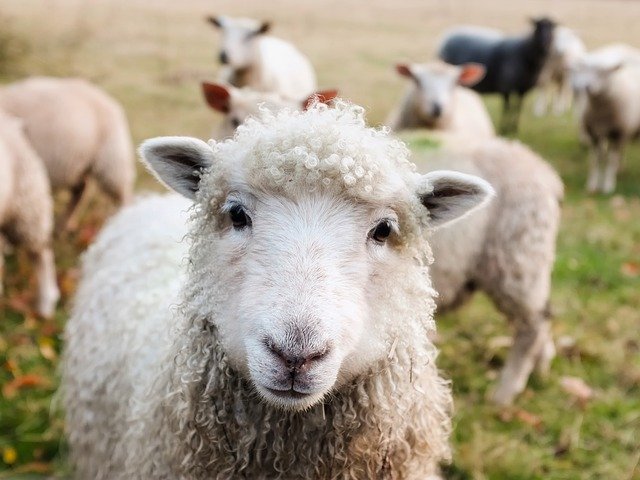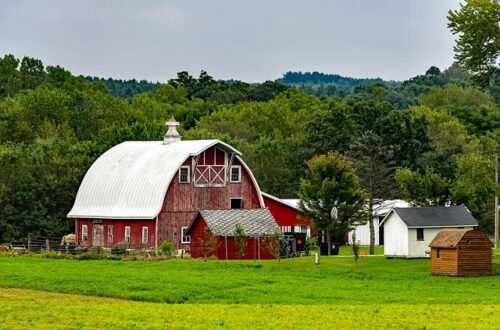Homesteading 101: Homesteading For Beginners

Have you ever dreamed about living off the land? Maybe you want to have a few acres, raise your own crops and animals, and have a more self-sufficient lifestyle. If so, we’ve prepared this tutorial about homesteading for beginners to get you started on the self-sufficiency adventure!
Homesteading is not only a lifestyle change, but a mindset change as well. Leaning to homestead requires hard work and a strong determination to keep at it when the going gets hard. However, the benefits of self-sufficiency are well worth the challenge!
If you’re considering making the move to homesteading, these tips will help you get going on your journey to self-sufficiency.
{Affiliate links included below}
📌pin this for later!📌

Self-sufficiency is a lifestyle choice
Starting a homestead and wanting to create a sustainable lifestyle is a great choice. Particularly in today’s unstable social and economic environment, moving towards food self-sufficiency is a wise move.
But being self-sufficient and living off the land can cover many areas beyond food. For example, this can involve finding new and creative ways to care for your family (and any animals you may have or acquire over time). This may include things like becoming energy independent (living off grid).

If you’re switching from a lifetime of city living to moving out into the country, the transition can be rough. You will need to be flexible and learn quite a few new things before you’re ready to take the full plunge when starting your own homestead.
Steps to become a self-sufficient homesteader
There are several important steps down the path of self-sufficiency.
First, you should assess your current lifestyle, and where you envision yourself down the road. Besides your family’s food needs, you will need to carefully evaluate your finances. You will have to budget not only for buying or renting a land and home, but basics like utilities, property taxes, and phone and internet bills. Ideally, you should have enough money set aside to cover unforeseen emergencies.
In today’s turbulent economy, you should also think about how to have multiple income streams. For example, you could sell wool from your sheep, milk products from cattle or goats, extra produce from your garden, and homemade soaps to make some extra money. Or you could start a side income online like blogging or an ecommerce shop.
A homestead also requires lots of time for planning, and physical labor to set up and keep it running smoothly. Ideally, a partner must be willing to work with you and help you get things done. If your partner isn’t on the same page and doesn’t like working hard outdoors, homesteading may not be the best choice.
Self-sufficiency can be a hard lifestyle choice, but the rewards are well worth it! While it can be overwhelming when you first start out, the transition experience will help you grow as a person and prepare you for the challenges ahead.

Ultimately, the decision to live in self-sufficiency will empower you and your family. If you have kids, they can learn age-appropriate chores and gain self-confidence. The homesteading lifestyle can also bring your family closer together as you all work hard towards a common goal.
It requires a strong constitution
Homesteading can be a real challenge, and beginners need to have a strong constitution to make it happen. In other words, you need to be determined to keep at it and press on toward your goals no matter what obstacles you may face.
The homesteading lifestyle involves more physical labor than most other lifestyles. It can be overwhelming at first, but this learning curve will help you grow into a stronger and more resilient person.
You will have a true sense of empowerment and independence as you reach each new goal. You’ll also be able to enjoy a life free of many constraints of modern life such as always having to run to the grocery store each time you’re out of food.

It requires a lot of work
There are many things to learn when starting a homestead. Whether you’re a totally new beginner or already have skills that will be useful on a homestead, there is always plenty of work to be done and a lot of patience is needed.
There can also be a culture shock involved that you’ll need to get used to. If you’ve lived in a city for all of your life, getting used to a more rural way of life can be a real adjustment.
It’s worth emphasizing that starting a homestead is not easy. It’s a serious undertaking that requires a lot of work, or what old-timers called “grit.” You need to be dedicated to uprooting yourself from your old “normal” and comfortable life. You may also have to face criticism and doubts thrown at you by friends and family.
If you need help getting started, reading some good homesteading books can help, or homesteading websites and videos can give you some inspiration.
Final thoughts on homesteading for beginners
Whether you’ve always wanted to start a homestead or you’re new to this idea, there are several things to keep in mind. The process of homesteading can be very stressful and challenging. You’ll need to carefully plan ahead to meet your goals. It’s important to prioritize what’s important to you and to know what you’re capable of.
While the process may be challenging, the rewards of homesteading can be very great. It enables you to live a more simple life, connect with nature, and become more self-sufficient.
Although there may be a steep learning curve, you’ll be rewarded with the opportunity to grow and develop yourself. You’ll feel more empowered and in control of your life. It can also bring your family closer together as you all work hard to achieve your homesteading goals.









2 Comments
mireille
This subject has always fascinated me and would like to one day become more self sufficient. Hoping we can move a little more out in the country at some point and make at least parts of it happen.
http://www.chezmireillefashiontravelmom.com
David
Yes, it’s a dream worth pursuing! Thanks for dropping by!